“What I learned in the CSO course was very helpful during [my job] selection process (especially everything related to communication), and I hope it will help me to keep my job for a very very long time.”
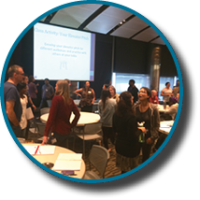
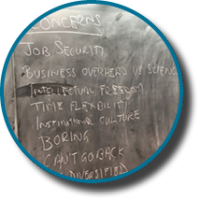
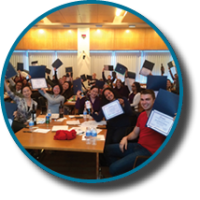
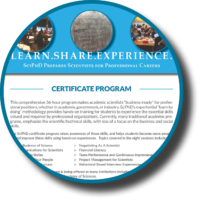
SciPhD’s Business of Science Certificate Program is offered as a 2 1/2 day on-site program, as well as virtually, both live, and on-demand. This program provides the essential business and social skills training valued by professional organizations. Our team-based experiential learning brings advanced communications, negotiations, project management, leadership and more to your PhD students and postdocs. You will form companies on your first day based on your own research, and work as a company throughout the program.
To request more information or schedule a program please fill out the brief form at the bottom of this page.
Certificate Program – includes the following modules:
Module 1: The Business of Science
Overview of the skills and behaviors valued by professional organizations. What kinds of jobs are available for PhDs, and what kinds of companies value PhDs. Using Flamingo, learn how to analyze a job ad, identify critical requirements, relate them to your accomplishments and build a powerful resume.
Module 2: Communications for Scientists
Your transition from academia to industry will require an upgrade in your communication competencies. Every leadership and job performance analysis places communications in the top 5 required competencies to be successful in industry. This module looks in detail at four essential communications competencies, and how to master them.
Module 3: Developing Your People
Developing Your People is all about managing, mentoring, and motivating in a team-based environment. In the professional world, beyond your technical skills and accomplishments, you will be judged on your ability to work in a team-based environment. This module focuses on motivating your team, mentoring, four stages of competency in learning, and effective managing.
Module 4: Applied Networking
Building relationships is the key to personal and business success. Having a strong network of diverse contacts provides you with access to a tremendous amount of information that can give you a competitive advantage in launching and advancing your career. Networking is about building genuine relationships and gaining advocates who will help you advance your career.
Module 5: Project Management
Scientists employ project management practices as a natural aspect of taking a hypothesis from idea to conclusion. As such you, as a scientist have significant experience doing project management. This module will connect the dots between your current practices and the language of project management, so that you can demonstrate that you have significant experience in project management to hiring managers.
Module 6: Team Performance
A business must constantly compete globally and improve on its products and services as well as its productivity. Continuous improvement is an ongoing effort to improve products, services, and/or processes. Working in teams requires a coordinated and disciplined approach to problem solving in order to accomplish these improvements. We will present 6 such “tools” to improve team performance.
Module 7: Financial Literacy
Fundamental to the two rules of business is the basic understanding of finance. Should you join a start-up or a legacy Pharma company? How does your personal risk compare with the financial health of a company? Is there a competitive interview advantage in knowing how EBITDA is used in business? This module addresses these essential questions that are fundamental to knowing the future of your employer and your own career.
Module 8: Negotiations
Negotiation is a dialogue between parties intended to reach an understanding, resolve points of difference, or to craft outcomes that satisfy various interests. Which negotiating techniques are about your interest vs. the other party’s interest vs. both parties’ interest? Note how often you are practicing Social Intelligence as you complete various exercises, especially salary negotiations for more money!
“Both Randy and Larry were super-approachable and available for individual discussions after class. -The venue was beautiful–even though I was tired at the end of the day, I looked forward to going to class. -For me, taking the course coincided with my academic job search and the interview process. The course really kept me in the mindset of transitioning to becoming a faculty member. Soon after the course ended, I got my first offer! -Thanks to the course content, I now feel prepared to manage my own lab.”
“The Scientist to CSO course has helped me broaden my horizons. As scientists, we tend to spend almost all our time in our little cocoons. The Scientist to CSO course introduced me to several important and broadly relevant concepts in the management of both people and projects and I have found these ideas extremely beneficial in my current activities as a research scientist in industry.”
“It helped me to develop the soft skills better on a broad scale, facilitate interactions in the academic environment, raise awareness when interacting with people from industry, finance, etc., improve managerial skills on the day-to-day basis and especially become savvier when negotiating things, applying for a job, getting the resume in tiptop cutting edge format”
“The class gives you the frameworks that help understand where scientists fit within business realms, and gives one the vocabulary to describe things one already does in a business-friendly way. This class, unlike anything offered by university career services, helps to understand how, as a PhD, one is seen by the business people. It gives students both the knowledge about the business world and the confidence to go for it. I would highly recommend the class.”
“Thank you very much for the opportunity to take this great course at the New York Academy of Sciences! I enjoyed taking these classes with you [Tom Magaldi], Larry and Randy! I attribute the success of my key [job] interview in large part to speaking with Randy three days before meeting with my [hiring] manager, as well as the overall class content.”
“The course helped me understand how to translate the skills I have from my research and make it applicable to industry, especially for non-research positions. I used these skills in applying for the position I’m currently being considered and expecting an offer for. I now have a better understanding of interpersonal communication and the forces that govern it. I’ve always thought of myself as a good communicator, but Larry and Randy showed me important nuances that made me even better. It helped me understand the road-blocks to effectively communicating with and developing a student I had been supervising!”
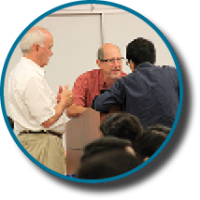
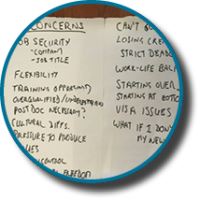
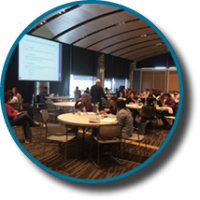
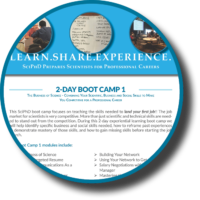
This SciPhD One Day Program focuses on the essential skills needed to land the first job!! SciPhD recognizes the challenges for PhD students and postdocs face in taking time away from the lab. This program provides the essential knowledge in an experiential program to get a competitive advantage.
Finding jobs that excite you, analyzing the job ad to identify all the critical skills, matching those to your experiences and accomplishments, and generating a targeted resume is all covered. Building and leveraging your network to get that targeted resume directly to the hiring manager, preparing for interviews, and negotiating your total compensation all combine to make you totally prepared to land your first job.
Get-A-Job One Day Prep Course – includes the following modules:
Module 1: The Business of Science
Overview of the skills and behaviors valued by professional organizations. What kinds of jobs are available for PhDs, and what kinds of companies value PhDs. Using Flamingo, learn how to analyze a job ad, identify critical requirements, relate them to your accomplishments and build a powerful resume.
Module 4: Applied Networking
Building relationships is the key to personal and business success. Having a strong network of diverse contacts provides you with access to a tremendous amount of information that can give you a competitive advantage in launching and advancing your career. Networking is about building genuine relationships and gaining advocates who will help you advance your career.
Module 8: Negotiations
Negotiation is a dialogue between parties intended to reach an understanding, resolve points of difference, or to craft outcomes that satisfy various interests. Which negotiating techniques are about your interest vs. the other party’s interest vs. both parties’ interest? Note how often you are practicing Social Intelligence as you complete various exercises, especially salary negotiations for more money!
Behavioral-Based Interview Preparation
Attendees will experience the behavioral-based interview process three times over the course of the program. Each experience is designed to integrate new knowledge from the preceding sessions and integrate that knowledge with previous lessons and experiences.




This acclaimed SciPhD half-day workshop focuses on teaching the skills needed to land the first job!! The job market for scientists is very competitive. More than just scientific and technical skills are needed to stand out from the competition. Understand how science is done in the professional world. Discover what you can be with a PhD, and the kinds of companies that value and hire PhDs. Learn the importance of networking, and the tips and tricks to build your network. The SciPhD Half-Day Workshop instills a sense of excitement and motivation and a path to launching your professional career.
SciPhD Half-Day Workshop – includes the following modules:
Module 1: The Business of Science
Overview of the skills and behaviors valued by professional organizations. What kinds of jobs are available for PhDs, and what kinds of companies value PhDs. Using Flamingo, learn how to analyze a job ad, identify critical requirements, relate them to your accomplishments and build a powerful resume.
Module 4: Applied Networking
Building relationships is the key to personal and business success. Having a strong network of diverse contacts provides you with access to a tremendous amount of information that can give you a competitive advantage in launching and advancing your career. Networking is about building genuine relationships and gaining advocates who will help you advance your career.
Hybrid Business of Science Certificate Program for Individuals
Access the full SciPhD experience in a self-paced format—anytime, anywhere.
For more than a decade, SciPhD has helped thousands of scientists successfully
transition from academia into rewarding industry careers.
Our new Hybrid Business of Science Certificate Program makes this
proven training available to individual scientists—combining our complete
online curriculum with live professional support and certification.
Program Highlights
- Eight Core Training Modules – Business, professional, and social competencies with indexed videos, tools, and self-assessment quizzes.
- Live Bi-weekly Check-In Sessions – Three interactive Zoom sessions each month with SciPhD experts.
- Certification Exam & Certificate of Achievement – Online exam validating your mastery of the Business of Science.
- Personalized Counseling – Three 30-minute one-on-one sessions (networking strategy, interview preparation, and compensation negotiation).
This program integrates self-paced, video-based learning inside Flamingo,
SciPhD’s interactive training platform, with live monthly check-in sessions and
personalized counseling to help you prepare, compete, and succeed.
Program Details
- Format: 100% Online (Hybrid) — self-paced modules + live sessions
- Time Commitment: Approximately 12–15 hours total, self-directed
- Access: Lifetime access to all materials through Flamingo
- Tuition: $90 — includes all content, live sessions, certification, and counseling eligibility
- Enrollment: Open year-round — start anytime
- Support: counseling@sciphd.com
Who Should Enroll
Graduate students, postdocs, and early-career scientists who want to translate their
academic experience into business-ready competencies, build targeted résumés, and
prepare for industry interviews and negotiations.
Compare SciPhD Training & Career-Readiness Programs
| Feature | Flamingo Entry-Level Tool |
Hybrid BoS Certificate Self-Paced + Live Support |
Business of Science Certificate Onsite / Virtual |
Get-a-Job One-Day Prep | Half-Day Workshop |
|---|---|---|---|---|---|
| Format | Self-paced online tool | Self-paced online modules + live Zoom check-ins + 1:1 counseling | Multi-session onsite or virtual cohort program | Intensive, full-day virtual/onsite workshop | Focused half-day virtual/onsite workshop |
| Primary Audience | Individual trainees | Individual trainees seeking full BoS experience at low cost | Institution-sponsored cohorts of PhD trainees | Trainees wanting a rapid “job-search bootcamp” | Large groups needing an introduction to SciPhD concepts |
| Key Outcomes | Analyze job ads and build targeted résumés | Full Business of Science curriculum, targeted résumés, interview prep, and BoS Certificate of Achievement |
Deep skill-building across SciPhD competencies plus career strategy and networking | Job-search strategy, résumé, and interview “quick start” | Awareness of business & social competencies for industry |
| Flamingo Access | Included | Included (full curriculum) | Included for cohort duration | Included (limited time / focused tools) | All presented modules incluided |
| Live Group Sessions | None | Bi-weekly Zoom check-ins with SciPhD coaches | Multiple live interactive sessions | Single full-day session | Single half-day session |
| 1:1 Counseling | Not included | Three 30-minute individual counseling sessions | Available as part of program design | Optional add-on | Optional add-on |
| Certification | No formal certificate | Business of Science Certificate of Achievement | Institutional Business of Science Certificate | Certificate of participation (where offered) | Certificate of participation (where offered) |
| Best Use Case | First step to explore SciPhD tools and language | Individual path to full BoS experience + certification | Comprehensive program for departments & institutions | Jump-start for near-term job seekers | High-level exposure for large audiences |
| Upgrade Path | Flamingo → Hybrid BoS Certificate Apply your Flamingo work directly into the hybrid program. |
Hybrid BoS → Onsite / Virtual Certificate Program Leverage your completed modules and certificate in institutional offerings. |
Can bundle or articulate to departmental programs and alumni offerings. | Ideal pre-work or follow-on to Hybrid BoS or full certificate. | Entry touchpoint that can lead to deeper programs. |
SciPhD Self-Guided Online Training Programs
| Feature | Flamingo Entry-Level Tool |
Flamingo Pro (legacy) |
Hybrid Business of Science Certificate Program |
|---|---|---|---|
| Flamingo & Online Modules | |||
| Flamingo – Import Job Ads | ✅ | ✅ | ✅ |
| Flamingo – Job Analytics | ✅ | ✅ | ✅ |
| Flamingo – Create Targeted Resumés | ✅ | ✅ | ✅ |
| Module 1: Business of Science | ✅ | ✅ | ✅ |
| Module 2: Communications | X | ✅ | ✅ |
| Module 3: Developing Your People | X | ✅ | ✅ |
| Module 4: Applied Networking | X | ✅ | ✅ |
| Module 5: Project Management | X | ✅ | ✅ |
| Module 6: Team Performance | X | ✅ | ✅ |
| Module 7: Financial Literacy | X | ✅ | ✅ |
| Module 8: Negotiations | X | ✅ | ✅ |
| Live Check-in Zoom Sessions | X | X | ✅ |
| Pricing & Access | |||
| Individual License Cost | $25 | n/a | $90 |
| Module Upgrades | $20 each | included | included |
| Counseling Services | |||
| Connecting to Companies | $200/hr | $100/hr | ✅ |
| Interview Preparation | $200/hr | $100/hr | ✅ |
| Negotiating Total Compensation | $200/hr | $100/hr | ✅ |
| Upgrade to Hybrid BoS Certificate Program | |||
| Upgrade Cost | $65 | $25 | n/a |
- Business of Science Certificate Program
-
Business of Science Certificate Program



 Certificate Program is available on-site and virtually live, or on-demand (via Flamingo Pro).
Certificate Program is available on-site and virtually live, or on-demand (via Flamingo Pro).SciPhD’s Business of Science Certificate Program is offered as a 2 1/2 day on-site program, as well as virtually, both live, and on-demand. This program provides the essential business and social skills training valued by professional organizations. Our team-based experiential learning brings advanced communications, negotiations, project management, leadership and more to your PhD students and postdocs. You will form companies on your first day based on your own research, and work as a company throughout the program.
To request more information or schedule a program please fill out the brief form at the bottom of this page.
Certificate Program – includes the following modules:
Module 1: The Business of Science
Overview of the skills and behaviors valued by professional organizations. What kinds of jobs are available for PhDs, and what kinds of companies value PhDs. Using Flamingo, learn how to analyze a job ad, identify critical requirements, relate them to your accomplishments and build a powerful resume.
Module 2: Communications for Scientists
Your transition from academia to industry will require an upgrade in your communication competencies. Every leadership and job performance analysis places communications in the top 5 required competencies to be successful in industry. This module looks in detail at four essential communications competencies, and how to master them.
Module 3: Developing Your People
Developing Your People is all about managing, mentoring, and motivating in a team-based environment. In the professional world, beyond your technical skills and accomplishments, you will be judged on your ability to work in a team-based environment. This module focuses on motivating your team, mentoring, four stages of competency in learning, and effective managing.
Module 4: Applied Networking
Building relationships is the key to personal and business success. Having a strong network of diverse contacts provides you with access to a tremendous amount of information that can give you a competitive advantage in launching and advancing your career. Networking is about building genuine relationships and gaining advocates who will help you advance your career.
Module 5: Project Management
Scientists employ project management practices as a natural aspect of taking a hypothesis from idea to conclusion. As such you, as a scientist have significant experience doing project management. This module will connect the dots between your current practices and the language of project management, so that you can demonstrate that you have significant experience in project management to hiring managers.
Module 6: Team Performance
A business must constantly compete globally and improve on its products and services as well as its productivity. Continuous improvement is an ongoing effort to improve products, services, and/or processes. Working in teams requires a coordinated and disciplined approach to problem solving in order to accomplish these improvements. We will present 6 such “tools” to improve team performance.
Module 7: Financial Literacy
Fundamental to the two rules of business is the basic understanding of finance. Should you join a start-up or a legacy Pharma company? How does your personal risk compare with the financial health of a company? Is there a competitive interview advantage in knowing how EBITDA is used in business? This module addresses these essential questions that are fundamental to knowing the future of your employer and your own career.
Module 8: Negotiations
Negotiation is a dialogue between parties intended to reach an understanding, resolve points of difference, or to craft outcomes that satisfy various interests. Which negotiating techniques are about your interest vs. the other party’s interest vs. both parties’ interest? Note how often you are practicing Social Intelligence as you complete various exercises, especially salary negotiations for more money!
Testimonials“What I learned in the CSO course was very helpful during [my job] selection process (especially everything related to communication), and I hope it will help me to keep my job for a very very long time.”
“Both Randy and Larry were super-approachable and available for individual discussions after class. -The venue was beautiful–even though I was tired at the end of the day, I looked forward to going to class. -For me, taking the course coincided with my academic job search and the interview process. The course really kept me in the mindset of transitioning to becoming a faculty member. Soon after the course ended, I got my first offer! -Thanks to the course content, I now feel prepared to manage my own lab.”
“The Scientist to CSO course has helped me broaden my horizons. As scientists, we tend to spend almost all our time in our little cocoons. The Scientist to CSO course introduced me to several important and broadly relevant concepts in the management of both people and projects and I have found these ideas extremely beneficial in my current activities as a research scientist in industry.”
“It helped me to develop the soft skills better on a broad scale, facilitate interactions in the academic environment, raise awareness when interacting with people from industry, finance, etc., improve managerial skills on the day-to-day basis and especially become savvier when negotiating things, applying for a job, getting the resume in tiptop cutting edge format”
“The class gives you the frameworks that help understand where scientists fit within business realms, and gives one the vocabulary to describe things one already does in a business-friendly way. This class, unlike anything offered by university career services, helps to understand how, as a PhD, one is seen by the business people. It gives students both the knowledge about the business world and the confidence to go for it. I would highly recommend the class.”
“Thank you very much for the opportunity to take this great course at the New York Academy of Sciences! I enjoyed taking these classes with you [Tom Magaldi], Larry and Randy! I attribute the success of my key [job] interview in large part to speaking with Randy three days before meeting with my [hiring] manager, as well as the overall class content.”
“The course helped me understand how to translate the skills I have from my research and make it applicable to industry, especially for non-research positions. I used these skills in applying for the position I’m currently being considered and expecting an offer for. I now have a better understanding of interpersonal communication and the forces that govern it. I’ve always thought of myself as a good communicator, but Larry and Randy showed me important nuances that made me even better. It helped me understand the road-blocks to effectively communicating with and developing a student I had been supervising!”
- Get-a-Job One Day Prep Course
-
Get-A-Job Complete One Day Prep CourseAll the Core Knowledge, Tips and Tricks You Need to Land Your First Job!




This SciPhD One Day Program focuses on the essential skills needed to land the first job!! SciPhD recognizes the challenges for PhD students and postdocs face in taking time away from the lab. This program provides the essential knowledge in an experiential program to get a competitive advantage.
Finding jobs that excite you, analyzing the job ad to identify all the critical skills, matching those to your experiences and accomplishments, and generating a targeted resume is all covered. Building and leveraging your network to get that targeted resume directly to the hiring manager, preparing for interviews, and negotiating your total compensation all combine to make you totally prepared to land your first job.
Get-A-Job One Day Prep Course – includes the following modules:
Module 1: The Business of Science
Overview of the skills and behaviors valued by professional organizations. What kinds of jobs are available for PhDs, and what kinds of companies value PhDs. Using Flamingo, learn how to analyze a job ad, identify critical requirements, relate them to your accomplishments and build a powerful resume.
Module 4: Applied Networking
Building relationships is the key to personal and business success. Having a strong network of diverse contacts provides you with access to a tremendous amount of information that can give you a competitive advantage in launching and advancing your career. Networking is about building genuine relationships and gaining advocates who will help you advance your career.
Module 8: Negotiations
Negotiation is a dialogue between parties intended to reach an understanding, resolve points of difference, or to craft outcomes that satisfy various interests. Which negotiating techniques are about your interest vs. the other party’s interest vs. both parties’ interest? Note how often you are practicing Social Intelligence as you complete various exercises, especially salary negotiations for more money!
Behavioral-Based Interview Preparation
Attendees will experience the behavioral-based interview process three times over the course of the program. Each experience is designed to integrate new knowledge from the preceding sessions and integrate that knowledge with previous lessons and experiences.
- Business of Science Half-Day Workshop
-
SciPhD Half-Day Business of Science WorkshopCombining Your Scientific, Business and Social Skills to Make You Competitive for a Professional Career




This acclaimed SciPhD half-day workshop focuses on teaching the skills needed to land the first job!! The job market for scientists is very competitive. More than just scientific and technical skills are needed to stand out from the competition. Understand how science is done in the professional world. Discover what you can be with a PhD, and the kinds of companies that value and hire PhDs. Learn the importance of networking, and the tips and tricks to build your network. The SciPhD Half-Day Workshop instills a sense of excitement and motivation and a path to launching your professional career.
SciPhD Half-Day Workshop – includes the following modules:
Module 1: The Business of Science
Overview of the skills and behaviors valued by professional organizations. What kinds of jobs are available for PhDs, and what kinds of companies value PhDs. Using Flamingo, learn how to analyze a job ad, identify critical requirements, relate them to your accomplishments and build a powerful resume.
Module 4: Applied Networking
Building relationships is the key to personal and business success. Having a strong network of diverse contacts provides you with access to a tremendous amount of information that can give you a competitive advantage in launching and advancing your career. Networking is about building genuine relationships and gaining advocates who will help you advance your career.
- Hybrid Certificate Program for Individuals
-
Hybrid Business of Science Certificate Program for Individuals
Access the full SciPhD experience in a self-paced format—anytime, anywhere.
For more than a decade, SciPhD has helped thousands of scientists successfully
transition from academia into rewarding industry careers.Our new Hybrid Business of Science Certificate Program makes this
proven training available to individual scientists—combining our complete
online curriculum with live professional support and certification.
Program Highlights
- Eight Core Training Modules – Business, professional, and social competencies with indexed videos, tools, and self-assessment quizzes.
- Live Bi-weekly Check-In Sessions – Three interactive Zoom sessions each month with SciPhD experts.
- Certification Exam & Certificate of Achievement – Online exam validating your mastery of the Business of Science.
- Personalized Counseling – Three 30-minute one-on-one sessions (networking strategy, interview preparation, and compensation negotiation).
This program integrates self-paced, video-based learning inside Flamingo,
SciPhD’s interactive training platform, with live monthly check-in sessions and
personalized counseling to help you prepare, compete, and succeed.
Program Details
- Format: 100% Online (Hybrid) — self-paced modules + live sessions
- Time Commitment: Approximately 12–15 hours total, self-directed
- Access: Lifetime access to all materials through Flamingo
- Tuition: $90 — includes all content, live sessions, certification, and counseling eligibility
- Enrollment: Open year-round — start anytime
- Support: counseling@sciphd.com
Who Should Enroll
Graduate students, postdocs, and early-career scientists who want to translate their
academic experience into business-ready competencies, build targeted résumés, and
prepare for industry interviews and negotiations. - Compare Programs
-
Compare SciPhD Training & Career-Readiness Programs
Feature Flamingo
Entry-Level ToolHybrid BoS Certificate
Self-Paced + Live SupportBusiness of Science Certificate
Onsite / VirtualGet-a-Job One-Day Prep Half-Day Workshop Format Self-paced online tool Self-paced online modules + live Zoom check-ins + 1:1 counseling Multi-session onsite or virtual cohort program Intensive, full-day virtual/onsite workshop Focused half-day virtual/onsite workshop Primary Audience Individual trainees Individual trainees seeking full BoS experience at low cost Institution-sponsored cohorts of PhD trainees Trainees wanting a rapid “job-search bootcamp” Large groups needing an introduction to SciPhD concepts Key Outcomes Analyze job ads and build targeted résumés Full Business of Science curriculum, targeted résumés, interview prep, and
BoS Certificate of AchievementDeep skill-building across SciPhD competencies plus career strategy and networking Job-search strategy, résumé, and interview “quick start” Awareness of business & social competencies for industry Flamingo Access Included Included (full curriculum) Included for cohort duration Included (limited time / focused tools) All presented modules incluided Live Group Sessions None Bi-weekly Zoom check-ins with SciPhD coaches Multiple live interactive sessions Single full-day session Single half-day session 1:1 Counseling Not included Three 30-minute individual counseling sessions Available as part of program design Optional add-on Optional add-on Certification No formal certificate Business of Science Certificate of Achievement Institutional Business of Science Certificate Certificate of participation (where offered) Certificate of participation (where offered) Best Use Case First step to explore SciPhD tools and language Individual path to full BoS experience + certification Comprehensive program for departments & institutions Jump-start for near-term job seekers High-level exposure for large audiences Upgrade Path Flamingo → Hybrid BoS Certificate
Apply your Flamingo work directly into the hybrid program.Hybrid BoS → Onsite / Virtual Certificate Program
Leverage your completed modules and certificate in institutional offerings.Can bundle or articulate to departmental programs and alumni offerings. Ideal pre-work or follow-on to Hybrid BoS or full certificate. Entry touchpoint that can lead to deeper programs. - Online Programs / Upgrade
-
SciPhD Self-Guided Online Training Programs
Feature Flamingo
Entry-Level ToolFlamingo Pro
(legacy)Hybrid Business of Science
Certificate ProgramFlamingo & Online Modules Flamingo – Import Job Ads ✅ ✅ ✅ Flamingo – Job Analytics ✅ ✅ ✅ Flamingo – Create Targeted Resumés ✅ ✅ ✅ Module 1: Business of Science ✅ ✅ ✅ Module 2: Communications X ✅ ✅ Module 3: Developing Your People X ✅ ✅ Module 4: Applied Networking X ✅ ✅ Module 5: Project Management X ✅ ✅ Module 6: Team Performance X ✅ ✅ Module 7: Financial Literacy X ✅ ✅ Module 8: Negotiations X ✅ ✅ Live Check-in Zoom Sessions X X ✅ Pricing & Access Individual License Cost $25 n/a $90 Module Upgrades $20 each included included Counseling Services Connecting to Companies $200/hr $100/hr ✅ Interview Preparation $200/hr $100/hr ✅ Negotiating Total Compensation $200/hr $100/hr ✅ Upgrade to Hybrid BoS Certificate Program Upgrade Cost $65 $25 n/a
